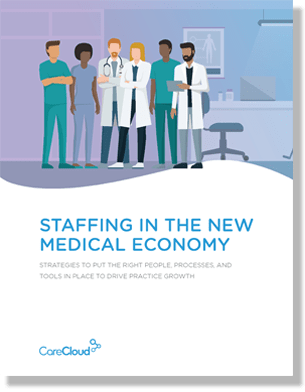This past March, the Supreme Court began hearing arguments for President Obama’s Affordable Care Act, which has become one of the most politically contested bills in American history.
Now the SCOTUS is on the brink of making a decision and nail clippings litter private practice floors. Doctors are afraid ACOs and the individual mandate will put them out of business.
Even ACA supporters must admit health reform doesn’t come without repercussions for physicians. Yesterday we looked at how the ACA may help your practice. Today we tackle the opposite side of the coin.
Enter your email: Sign Up
Doctors Just Don’t Support It
According to a Doctors Company survey conducted earlier this year, 60% of physicians believe healthcare reform will have a negative impact on patient care.
One Michigan surgeon was quoted, claiming healthcare reform represents a move further away “from humanity-based health care and more towards the patient as a commodity. This was not the way my father practiced – nor will I. Winding down to retire early.”
As a matter of fact, 43% of respondents admitted they’d consider retiring within the next five years as a result of the ACA. This doesn’t fare well for medical demand in the United States, which will need an additional 91,500 doctors by 2020 according to the American Association of Medical Colleges’ numbers.
We all know a medical practice can’t be run without doctors.
Less Pay, Less Motivation
While the ACA won’t change how patients seek medical attention on a basic operational level, it brings about a number of systematic changes. By mandating insurance, the federal government deals with issues of adverse selection and the like.
Furthermore, requiring insurance reduces the amount of patients seeking insurance, not limiting these to persons with adverse health conditions. This kind of activity problematically controls costs within the health insurance market, altering market prices in a way that results in what’s become a notorious 16.7% average pay cut for physicians. And without the compensation our physicians are accustomed to, you can expect less motivated medical treatment.
As it is, the ACA doesn’t address reimbursement rates for Medicare and Medicaid patients, perhaps the most serious concern among primary care doctors and their primary gripe with the American Medical Association, who supports health reform.
Doctors currently earn $20 for each Medicaid patient, versus a total of up to $260 per privately insured visit. Given the cost of overhead, private practices actually lose money on public patients, and this hasn’t been adequately addressed by the ACA.
Insurance Doesn’t Equal Care
With universal insurance, one patient’s wishes may interfere with another patient’s more urgent needs. Medical practice waiting rooms across the country are already swarming, filled to the brim with low-paying, highly-regulated insurance holders, causing waiting times to rise and lowering access to quality medical care.
Expect that to increase under the ACA. Despite Justice Sotomayor’s point that everyone will get sick and need healthcare at some point, health insurance won’t guarantee you’ll receive it, at least not in a timely manner.
Health insurance regulations hinder physicians and staffs at private medical practices, and they’re all increasing under the ACA. Even emergency room visits aren’t streamlined by mandating individual medical insurance.
Studies show that Medicaid patients are actually more prone to false alarm ER visits than the uninsured, which, according to the Annals of Internal Medicine, results in a $4.4 billion dollar yearly tab.
This leads to packed ERs, long waiting times and interference with possible life-saving treatments other patients may need. So why not propose mandates that force ERs to take in all patients, even the uninsured? Or better yet, why not bolster the ability of private practices to take in some of these ‘false alarm’ patients?
Lastly, the ACA’s proposed Independent Medicare Advisory Board and other regulatory committees will make it increasingly challenging for physicians to practice under comfortable conditions, preventing practices from ordering the tests and treatments patients may desperately need.
Private practices will require more staff hours, and it’ll be more difficult for patients to find practices that will accept their insurance policies. According to the Physicians’ Foundation 2010 Doctor Survey, a majority of private practice doctors said the ACA will increase patient volumes, and nearly 70% said they don’t have the time or resources to accommodate this influx.
What will the government do then? Maybe propose an additional mandate that forces doctors to treat more patients. Mandate for mandate.
Fewer Doctor-Owned Practices?
More physicians have been compelled to leave individual practice and take salaried positions at hospitals since the Affordable Care Act’s passage, and researchers predict this trend will only become more pronounced over the next few years.
Under the ACA, physician-owned practices must apply for authorization from the Department of Health and Human Services, endure a “community approval” period and be located in an area where population measures are met.
Heritage Foundation researcher Ed Haislmaier predicts the ACA will speed up the national decline in doctor-owned practices, namely because doctors will be compelled to accept more cash-favoring patients. And considering that less than 50% of all medical practices in the United States are currently physician-owned, this spells trouble for the healthcare industry.
In addition, the advent of Accountable Care Organizations and other provisions of the ACA accelerate the movement of physicians into larger groups, endangering the existence of small practices. It would be a logistical nightmare for three to six doctor practices to weather that kind of storm, and America just isn’t fit to give up all care delivery models in favor of one overarching system.
The ACA is frightening for private practices. Their concerns are legitimate, particularly in a system that historically has been loosely regulated. The right to purchase health insurance is a decades-old tenet of America’s free enterprise system, interwoven in our national DNA even, and upending that system could result in grievous outcomes.
What do you think? Does your medical practice fear the outcome of the Supreme Court’s health reform ruling?




